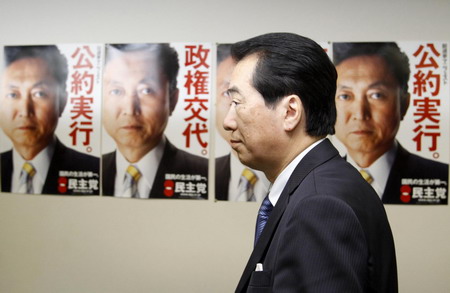Asia-Pacific
Japan Finmin Kan certain to be next PM - media
(Agencies)
Updated: 2010-06-04 07:59
 |
Large Medium Small |
|
|
Kan, a former health minister once known for battling bureaucrats, has forged an image as a fiscal conservative and occasional central bank critic since assuming the finance post in January.
If he becomes premier, that could spell bolder steps to rein in the huge public debt, although he would face opposition from many in his party ahead of the election.
|
||||
He is expected to form a new cabinet later the same day.
The Democrats swept to power in a historic election last year and will run the government whatever the outcome of the July upper house poll, but the ruling bloc needs to win a majority in that chamber to ensure that legislation is enacted smoothly.
Media surveys showed Hatoyama's resignation had given the party a boost. In an Asahi newspaper poll, 28 percent of voters said they planned to cast their ballots for the Democrats against 20 percent for the opposition Liberal Democratic Party, ousted last year after more than 50 years of almost non-stop rule. That compared to 20 percent who favoured the DPJ in previous survey.
A Yomiuri newspaper poll also showed a similar boost in voter support for the Democrats in next month's upper house election.
Kan, known for his short temper, became Japan's most popular politician for a time when he battled bureaucrats as health minister in 1996 to expose a scandal over HIV-tainted blood products.


